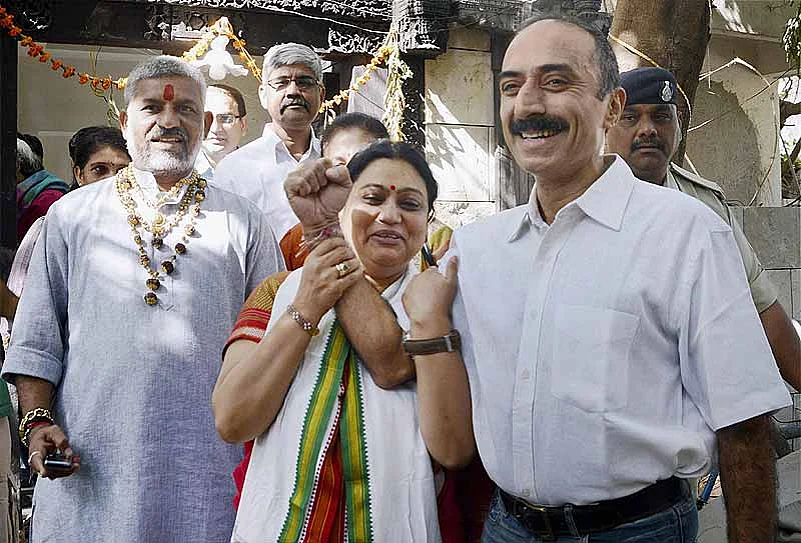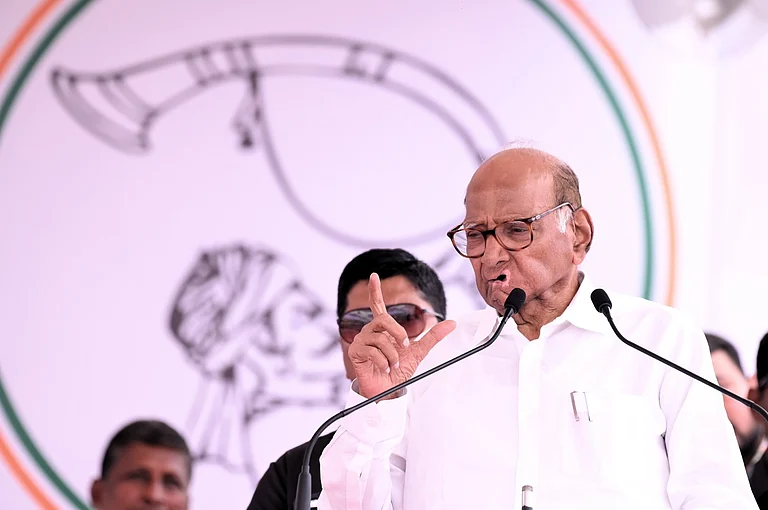On Poll-Eves
- Total Women Candidates: BJP: 19, Congress: 13
- For 87 seats on Dec 13: BJP: 11 women; Congress: 5
- For 95 seats on Dec 17: BJP: 8 women; Congress: 8
The strong alpha male figure that he is in Gujarat, Narendra Modi evokes love and hate in equal measure among women. So, if there’s a sizeable number that dotes on him, dons the BJP’s colours, cheers loudly for their CM and campaigns for him, he also has some of the most consistent and doughty fighters ranged against him, be it Teesta Setalvad, Shabnam Hashmi or Mallika Sarabhai. These women have waged a long anti-Modi crusade, often figuring in bruising TV studio battles on the man and his politics. Now the battle is turning more directly political, with two women—Shweta and Jagruti—taking him on electorally. Neither social activists nor politicians, these are two Brahmin housewives, who have decided to challenge Modi in the electoral arena.
IPS officer Sanjeev Bhatt’s wife Shweta has chosen Modi’s own assembly seat, Maninagar, and a Congress ticket to mount her fight. “I’m not a politician,” she tells Outlook. “But I’m fighting a man who has least respect for women in his heart. Not only minorities, his own party workers’ families and women of the state, he has harassed three women of my family: me, my daughter and my 85-year-old mother. He damaged the dignity of the police uniform by sending junior officers to harass us.”
Joining Shweta on the electoral warpath is Haren Pandya’s widow, Jagruti, contesting from her husband’s seat, Ellisbridge, under the aegis of Keshubhai Patel’s new party, the Gujarat Parivartan Party. Pandya was shot dead under mysterious circumstances on March 26, 2003, amidst rumours that people in the Modi regime wanted him out of the way. “I’ve been fighting for justice since the day of my husband’s murder,” says Jagrutiben. “I am going to my voters with the request that they should stand for justice and vote for Harenbhai.” But why the gpp and not her husband’s party? “My candidature and fight is a message to other suppressed BJP leaders and workers victimised by the CM. They must stand up and speak out now.”

The awakening Jagruti Pandya
Modi arouses strong feelings in Gujarat’s women, and certainly not always against him. The BJP, in fact, is fielding more women candidates this election than the Congress (see graphic below). Says Sangitaben Rajendrabhai Patil, BJP candidate from Limbayat, “Women in the state feel safe and protected in the rule of Narendrabhai Modi. He is good to women and at the same time his development programmes have helped us all.” She’s also part of the Modi Samarthak Mahila Mandal (an all-women Modi fan club), which she insists is not formally with the BJP. “We’re not a branch or another face of the BJP; we’re an independent organisation and support our chief minister on the basis of his work,” she says.
A BJP member for several years, Sangitaben may gag on questions regarding development and gender-related issues in the state, but finds a firm voice when talking of their ‘contribution’ to the Modi campaign. It begins with dressing the part—in saffron saris with lotus prints—and going door to door with other women soliciting votes for herself and Narendrabhai. This ‘fan club’ might deny being “another branch or face” of the BJP, but obviously works as an adjunct to the party’s formal campaign.
Modi’s women fans also boast a Muslim name. Asifa Khan began her career as a journalist and is now part of the team managing the media—international and national—covering the polls. “The women opposing Modi,” she declares, “have political motivations. I’m a Muslim and now a member of the BJP because I appreciate the inclusive development in the rule of Modiji.” She had no satisfactory answer, though, when asked why Modi could not give a single ticket to a minority candidate. Asifa had joined active politics in 2008 when Congress master strategist Ahmad Patel (whom Modi now refers to as Ahmad Mian Patel) asked her to. Now, it seems, Modi asked her to, and she saw him as a better prospect.
Whether they love him or hate him, the women around Modi make as much news as the man himself. More so perhaps, if they’re at the opposing end. There’s no let-up in Shweta’s rage against Modi, as she continues to be scathing about his ‘respect’ for women: “He justifies malnutrition among women as a conscious attempt to keep themselves slim. His comments about Sunanda Pushkar too were tasteless.” Challenges like Shweta’s may not amount to much politically, but are no less significant. Though activists like Teesta have stayed away from electoral contests and concentrated on fighting the riots cases, Shabnam Hashmi has been in Gujarat since June and her anti-Modi struggle is acquiring political contours.


























